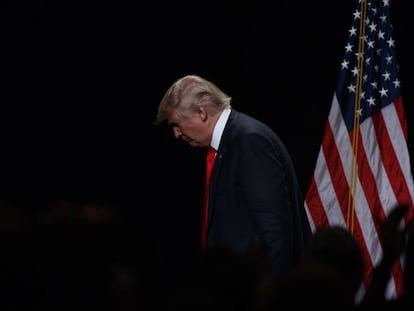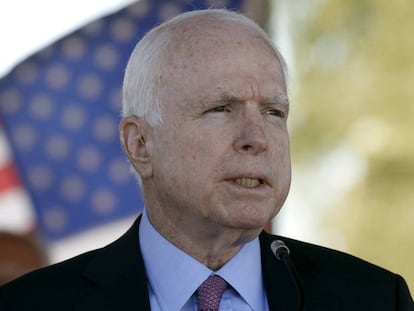Donald Trump fails to contain growing Republican Party rebellion
GOP heavyweights abandon the presidential candidate, accusing him of being a threat to his own country


Donald Trump’ loneliness at the top of the Republican Party is more and more evident every day. The GOP presidential candidate who will face Democrat Hillary Clinton in November has the backing of millions of voters but fails to win over party leaders. Maine Senator Susan Collins and 50 Republican senior security and defense officials from past administrations have said they do not believe the New York businessman possesses the character to be the president of the United States.
Trump has become the de facto leader of the Republican Party since he was crowned as the official GOP nominee for the White House at the Republican National Convention in Cleveland, Ohio in July. Delegates in Cleveland closed ranks around him and some of the most prominent GOP figures took the stage to defend him. Paul Ryan, the speaker of the House of Representatives, spoke up for Trump albeit without much enthusiasm. The Senate majority leader, Mitch McConnell, also urged Republicans to vote for the real estate mogul.
Trump has turned his back on the national security complex, the “deep state,” that network of experts, senior officials, formidable spies and politicians
Yet the absence of former Presidents George H.W. Bush and George W. Bush, the last two GOP presidential nominees, John McCain and Mitt Romney, and the governor of the state that hosted the event, John Kasich, was a clear sign that the New York magnate was having a hard time uniting the party. His main rival in the primaries, Texas Senator Ted Cruz, was booed off the stage as he delivered a speech that failed to endorse the candidate.
From then on, everything has gotten much worse for Donald Trump. His ratings are falling. He has refused to heed advice and take on a more presidential tone. He has maintained his usual style: insults, slights, an insistence on demolishing what he calls political correctness. Meanwhile, the ranks of dissidents forming against him within the GOP are growing.
Trump received a one-two punch this week as 50 high ranking national security officials from past Republican administrations going all the way back to Richard Nixon in the late 1960s published an open letter that questioned his abilities and Republican Senator Collins wrote a searing article in The Washington Post denouncing him. Both texts, written in similar language, say his character makes him unfit to be commander-in-chief.
Senator Susan Collins, a moderate conservative, cited Trump’s suggestion that a federal district judge might be biased because of his Mexican heritage, his remarks mocking a disabled journalist, and his criticism of the family of an American Muslim soldier who died in combat in Iraq. She said Trump is “unworthy of being our president” and his “lack of self-restraint and his barrage of ill-informed comments would make an already perilous world even more so.” Trump dishonors GOP traditions and she, therefore, does not feel compelled to vote for him in November, Collins added. She is the fourth Republican senator to announce her decision to not vote for her party’s official candidate. About a dozen GOP senators have expressed reservations about supporting Trump.
Meanwhile, 50 senior officials — including ex-CIA Director Michael Hayen and former Secretaries of Homeland Security Michael Chertoff and Tom Ridge— signed an open letter published on Monday to warn Americans that Trump would make “a dangerous president,” “the most reckless in American history.”
Ex-CIA chief Michael Hayden said in February that the armed forces might disobey some orders the GOP candidate has suggested
These are strong accusations to launch against a presidential candidate from one of the country’s two major parties. And they are even more significant seeing as they came from the thinkers and leaders who, under normal circumstances, would be helping their candidate prepare his presidential agenda and a smooth transition to the White House.
Trump has turned his back on the national security complex, the “deep state,” that network of experts, senior officials, formidable spies and politicians who are the guarantors of continuity in foreign policy and national defense of the most powerful country in the world.
If Trump wins in November, he will have to reconcile with this group or the United States will enter unchartered territory: a conflict between political and military powers. Ex-CIA chief Michael Hayden said in February that the armed forces might disobey some orders - say, killing family members of suspected terrorists as the GOP candidate has suggested. “You are required not to follow an unlawful order,” Hayden explained.
Sign up for our newsletter
EL PAÍS English Edition has launched a weekly newsletter. Sign up today to receive a selection of our best stories in your inbox every Saturday morning. For full details about how to subscribe, click here
Not all dissenting Republicans are expected to vote for Hillary Clinton, but sometimes they speak more harshly about Trump than against the Democratic Party. It is precisely in traditionally conservative circles —from renowned columnists on the right like George Will to think tanks like the American Enterprise Institute— where Republicans air out some of their most bitter complaints against Trump. The Weekly Standard, a neoconservative magazine, published an article this week that compares Speaker Ryan —the great hope of American conservatives who finally capitulated to Trump— with Marshal Pétain, the decorated World War I French military officer who ended up running France for Adolf Hitler.
English version by Dyane Jean-François.
Tu suscripción se está usando en otro dispositivo
¿Quieres añadir otro usuario a tu suscripción?
Si continúas leyendo en este dispositivo, no se podrá leer en el otro.
FlechaTu suscripción se está usando en otro dispositivo y solo puedes acceder a EL PAÍS desde un dispositivo a la vez.
Si quieres compartir tu cuenta, cambia tu suscripción a la modalidad Premium, así podrás añadir otro usuario. Cada uno accederá con su propia cuenta de email, lo que os permitirá personalizar vuestra experiencia en EL PAÍS.
En el caso de no saber quién está usando tu cuenta, te recomendamos cambiar tu contraseña aquí.
Si decides continuar compartiendo tu cuenta, este mensaje se mostrará en tu dispositivo y en el de la otra persona que está usando tu cuenta de forma indefinida, afectando a tu experiencia de lectura. Puedes consultar aquí los términos y condiciones de la suscripción digital.










































